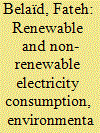| Srl | Item |
| 1 |
ID:
178831


|
|
|
|
|
| Summary/Abstract |
This study scrutinizes the impact of globalization, non-renewable energy consumption, and economic growth on CO2 emission for selected South Asian economies during 1985–2018 under the EKC framework. For this purpose, we apply a fully modified ordinary least square (FMOLS) technique. The empirical findings of this study identify that globalization is positively associated with CO2 emission. The results also indicate that non-renewable energy consumption increasing environmental pollution. Moreover, the results confirm the EKC hypothesis in the South Asian region; this means that at the early stages of development, when economic growth increases, environmental pollution also increases, but environmental degradation starts to decrease with the increases in economic growth after the threshold point. The empirical outcomes suggest that the government should subsidize and promote renewable energy sources to tackle the problem of environmental degradation.
|
|
|
|
|
|
|
|
|
|
|
|
|
|
|
|
| 2 |
ID:
168701


|
|
|
|
|
| Summary/Abstract |
In this article, we develop an empirical model to investigate the causal link amid renewable and non-renewable electricity consumption, GDP and carbon emissions by using a panel of 9 Mediterranean countries over the period 1980–2014. Using the PMG panel ARDL and panel econometric technics, heterogeneity and cross-sectional dependence among the panel were considered to explore the long and short-run dynamic relationships as well as the validity of a proposed model. The results provide panel empirical evidence that there is short-term bidirectional causality between GDP, renewable electricity consumption and CO2 emissions and between non-renewable electricity consumption, GDP and renewable electricity consumption. For the long-term causal relationship, the result indicates that there is bidirectional causality between non-renewable electricity consumption and CO2 emissions. However, there is evidence of unidirectional causal relationships from GDP to CO2 emissions and non-renewable electricity consumption and from renewable electricity consumption to CO2 emissions. The findings imply that non-renewable electricity consumption and economic growth stimulate CO2 emissions in southern and northern Mediterranean countries, while renewable electricity reduces them. This empirical evidence suggests that expansion of renewable energy sources is a viable strategy for addressing energy security and reducing carbon emissions to protect the environment for future generations.
|
|
|
|
|
|
|
|
|
|
|
|
|
|
|
|